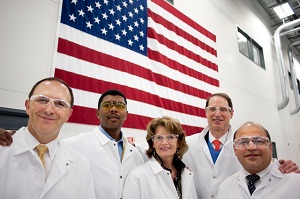Oregon’s Senatorial delegation, SolarWorld speak out against Chinese solar industry
 Oregon’s U.S. Senators Ron Wyden (D) and Jeff Merkley (D) joined Gordon Brinser, SolarWorld Industries America president and spokesperson for Coalition for American Solar Manufacturing, on Oct. 19 in Washington, D.C., to announce the filing of trade petitions against Chinese solar companies.
Oregon’s U.S. Senators Ron Wyden (D) and Jeff Merkley (D) joined Gordon Brinser, SolarWorld Industries America president and spokesperson for Coalition for American Solar Manufacturing, on Oct. 19 in Washington, D.C., to announce the filing of trade petitions against Chinese solar companies.
The coalition of seven U.S. crystalline silicon photovoltaic manufacturers is fighting against alleged illegal dumping and anticompetitive subsidies that allow Chinese solar manufacturers to sell solar at lower than market prices.
The coalition filed petitions with U.S. Department of Commerce and the International Trade Commission.
“Ultimately, the petitions request that the commerce department impose significant duties on Chinese imports of solar cells and modules to offset the amount of unfair pricing and massive subsidies,” said Tim Brightbill, a lawyer with Wiley Rein LLP, which filed the petitions. “The cases are among the largest filed against China and they are the first antidumping and countervailing duty petitions involving the renewable energy sector.”
SolarWorld, the largest U.S. manufacturer of crystalline photovoltaics, led the coalition.
“It’s a strong company with a strong brand in the U.S.,” Brisner said in an interview following the conference.
It’s not imperiled by the Chinese competition, but its actions were spurred by it.
“We saw the decimation of the U.S. solar industry happening,” he said, “and we need a strong vibrant manufacturing industry for us to be strong and compete.”
That’s partly because the company needs supporting domestic infrastructure.
“Without strong domestic manufacturing in the U.S. the supply chain will cease to exist. We see it as incumbent on us because it helps us build a good strong SolarWorld,” Brisner said. “If you look at the number of companies still producing in the U.S., it is alarming at what is remaining in the U.S., and the amount of imports has decimated what used to be a solid industry.”
Sen. Wyden, who chairs the Subcommittee on International Trade, Customs and Global Competitiveness, said that while the solar industry has been expanding globally, the U.S. solar industry and domestic jobs have been hurting because of Chinese subsidies.
“As my subcommittee has found, there seems to be one primary explanation for this. That is that China is cheating,” he said. “China has been providing massive direct subsidies, tax preferences, preferential loans, land deals and export credits to help Chinese producers of solar panels rapidly increase production and exports.”
The country does not properly report its subsidies to the World Trade Organization.
“And as the U.S. Trade Representative has found, the subsidies that we know about appear to be actionable subsidies that the United States can employ trade remedies to address,” Wyden said.
In four years, Chinese solar imports to the U.S. increased by over 1,500 percent, according to Wyden.
“At subsidized prices well below the market rate, China's global share of exports is rapidly expanding at the expense of practically every other leading producer,” he said.
Lower prices now could mean higher prices later, Merkley, a member of the Banking, Housing and Urban Affairs Committee, said.
“We've always understood in international trade that it's not okay to produce and sell below the basic cost of the product in order to have a predatory takeover of a market. Not only is it not okay because it wipes out jobs, but once you wipe out the competition, then prices go up and you hurt the consumers as well,” he said.
Pictured: Senators Wyden and Lisa Murkowski (R-Alaska) at SolarWorld.



